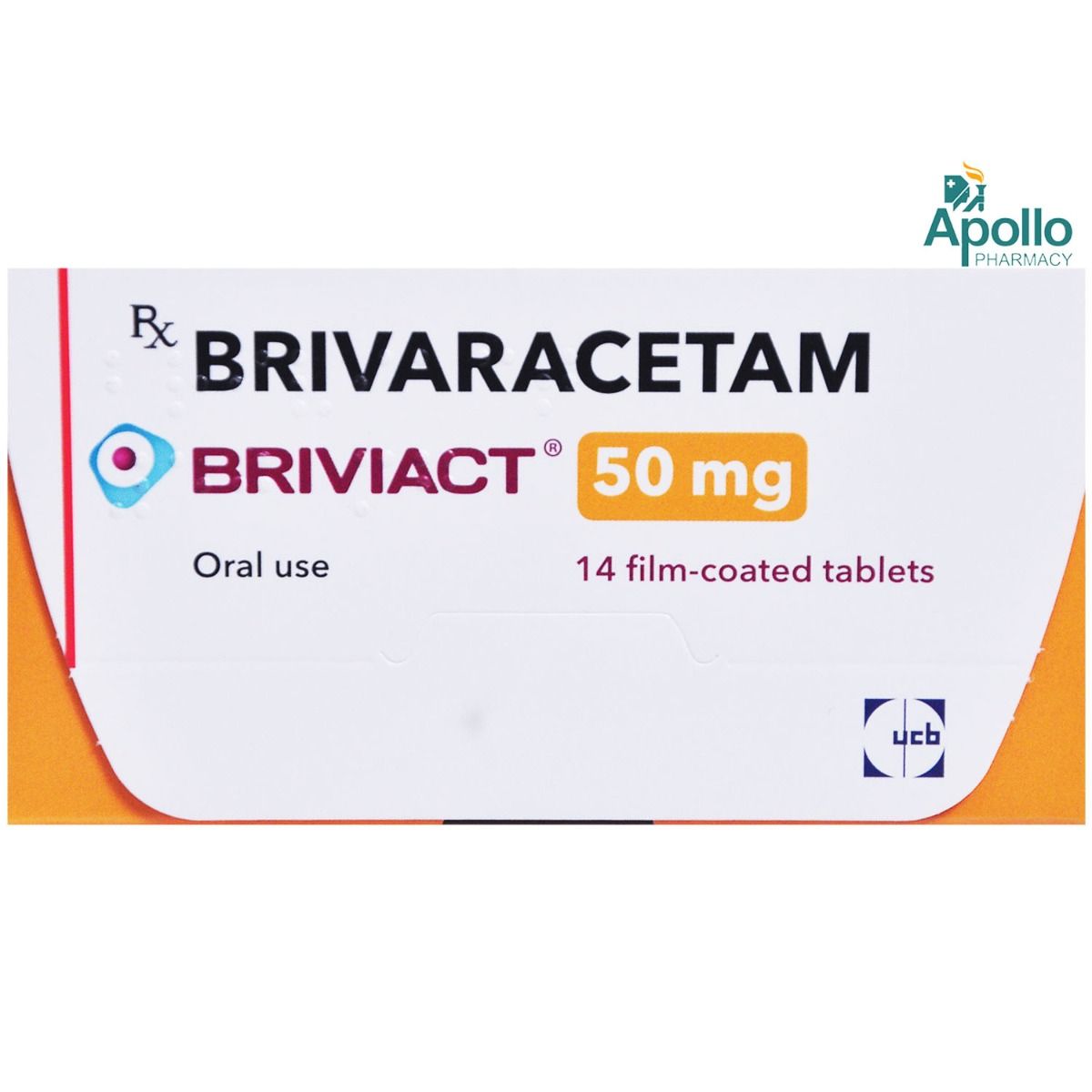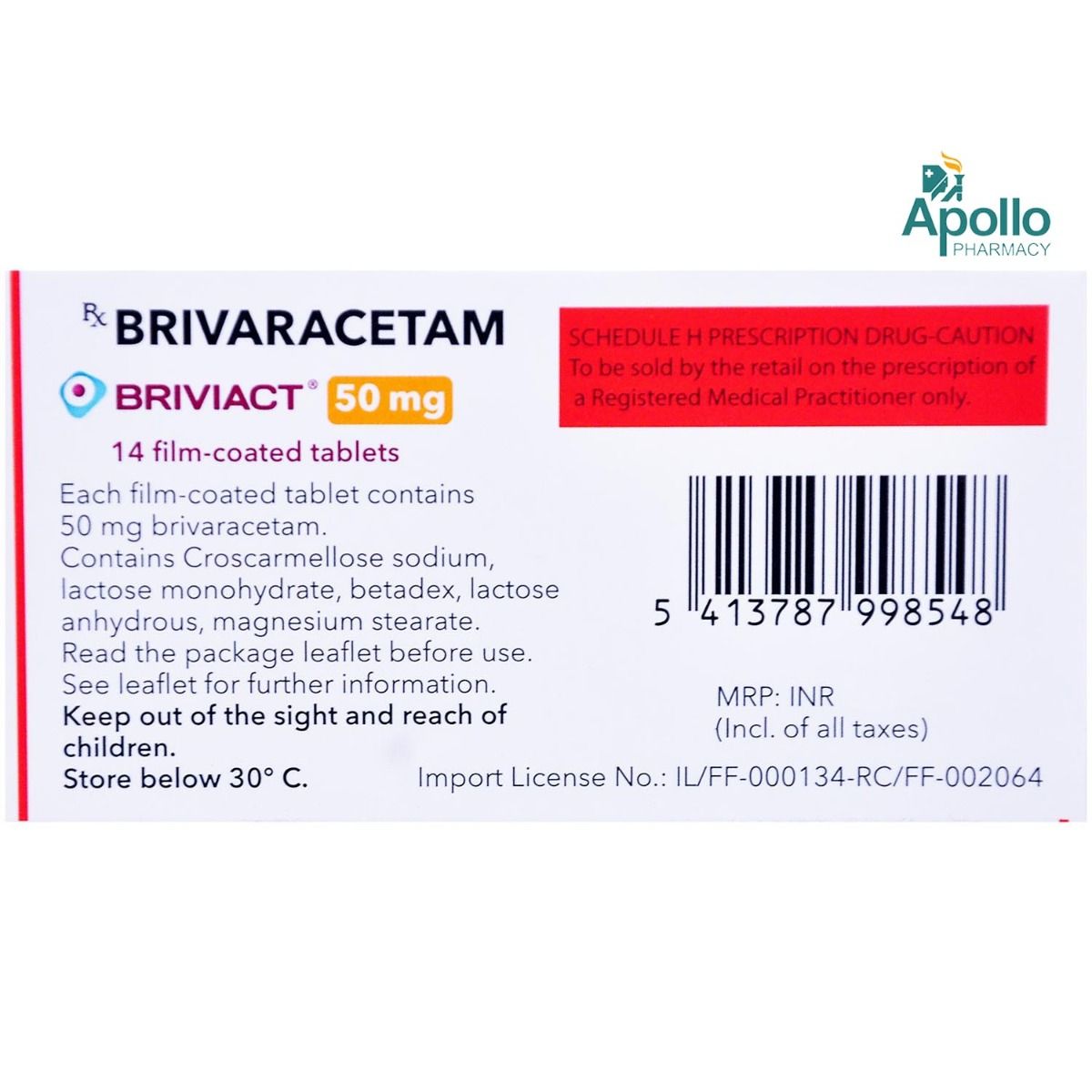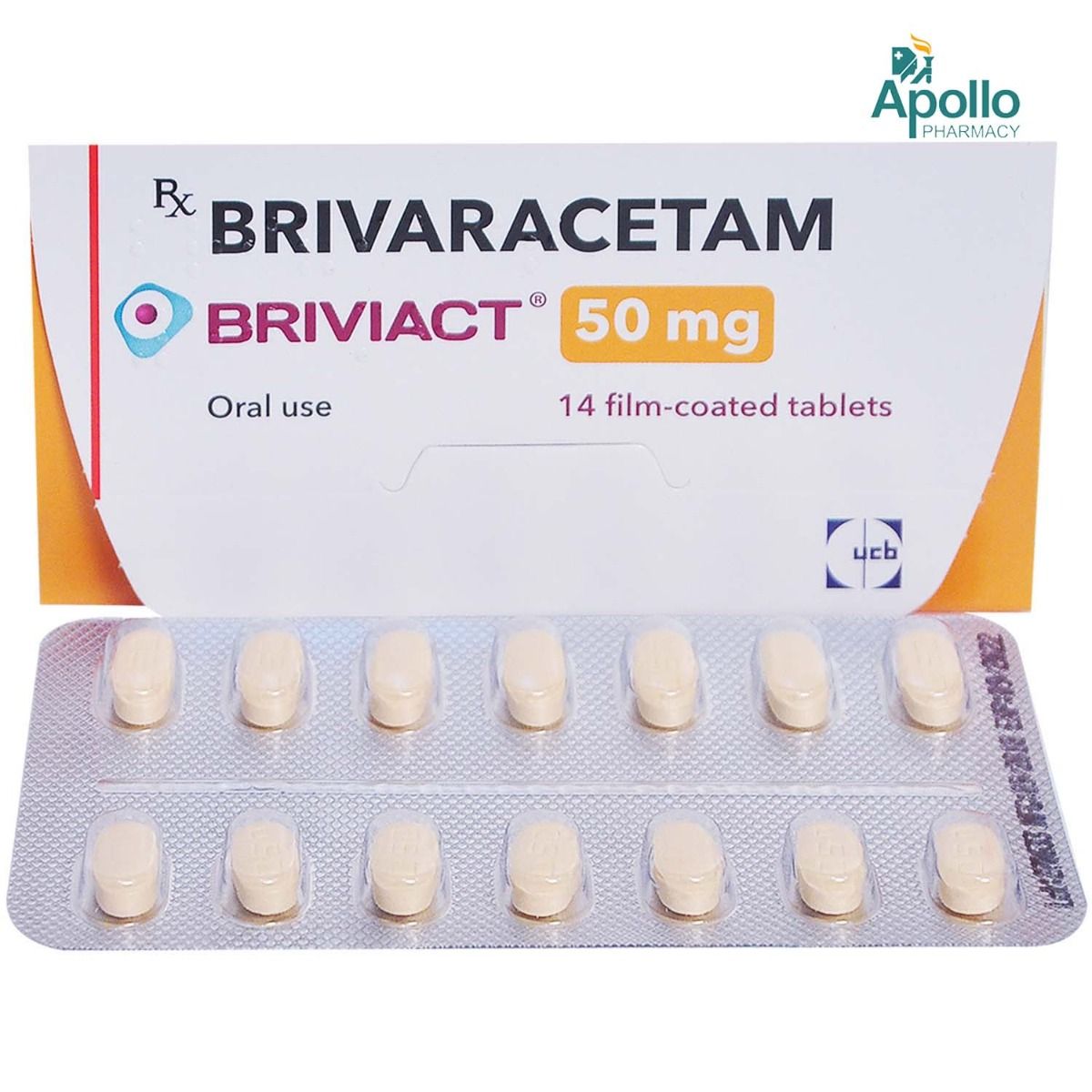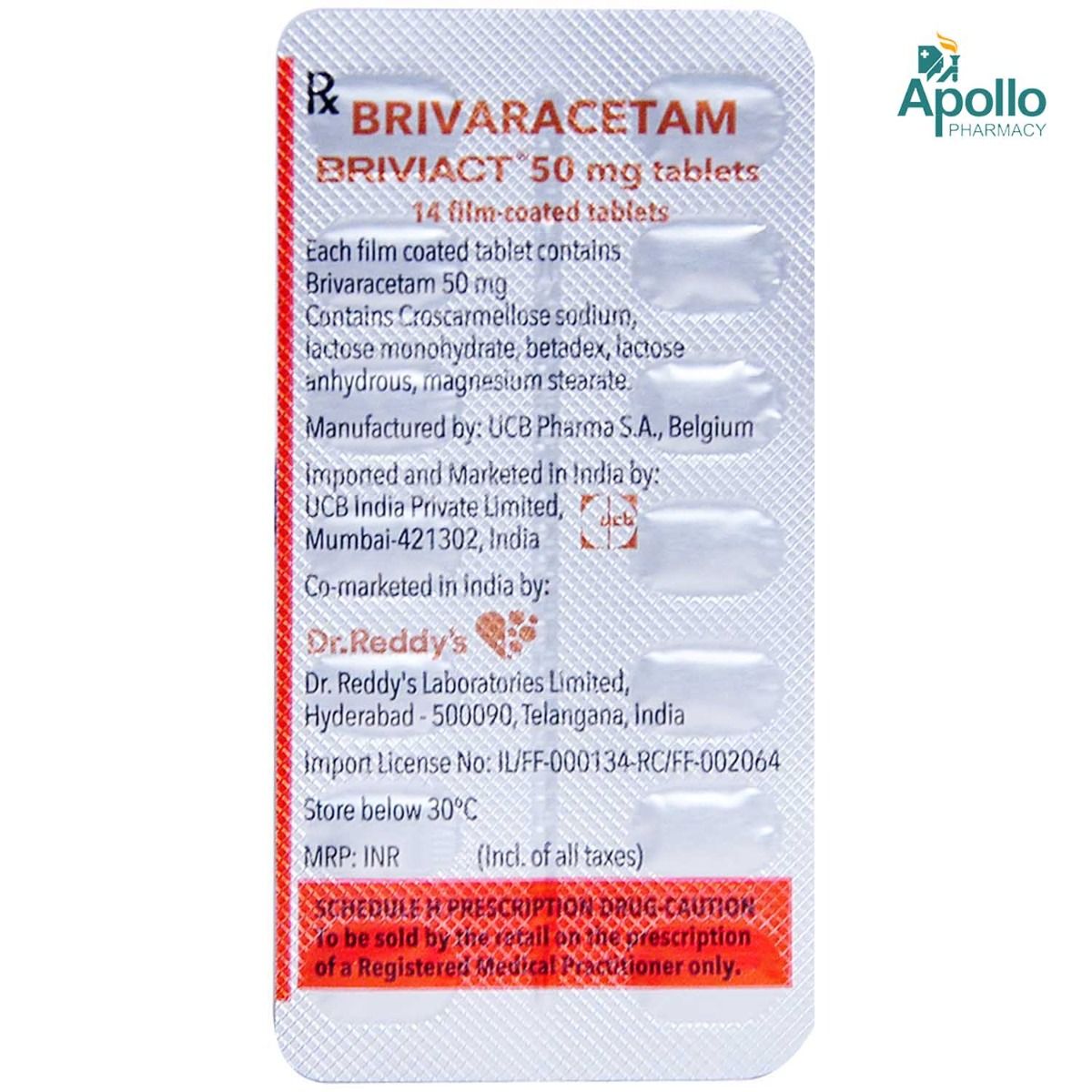Briviact 50 mg Tablet 14's





₹1344.6*
MRP ₹1494
10% off
₹1269.9*
MRP ₹1494
15% CB
₹224.1 cashback(15%)
Free Delivery
With Circle membership
(Inclusive of all Taxes)
This offer price is valid on orders above ₹800. Apply coupon PHARMA10/PHARMA18 (excluding restricted items)
Briviact 50 mg Tablet is used to treat partial-onset seizures (seizures involving only one part of the brain) in people with epilepsy (fits) in patients one month of age and older. It contains Brivaracetam, which decreases the brain's excessive and abnormal nerve activity and thus controls seizures. It may cause common side effects such as excessive sleepiness, dizziness, overtiredness, nausea and vomiting.
Know Your Delivery Time
Provide Delivery Location
Available Offers
 Prescription drug
Prescription drugWhats That

Secure Payment

India's Most Trusted Pharmacy

Genuine Products
Composition :
Manufacturer/Marketer :
Consume Type :
Return Policy :
Expires on or after :
About Briviact 50 mg Tablet
Briviact 50 mg Tablet is used for treating partial-onset seizures (seizures involving only one part of the brain) in people with epilepsy (fits) in patients one month of age and older. Partial-onset seizures are characterized by abnormal electrical activity in only one brain hemisphere. Common symptoms are involuntary muscle contractions, followed by relaxation on one side of the body, uncontrolled head or eye movements, rapid heart rate, and a tingling sensation on the skin.
Briviact 50 mg Tablet contains '‘Brivaracetam' that reduces the electrical impulses and subsequent firing of the nerve impulses that cause fits. Thus, Briviact 50 mg Tablet decreases the brain's excessive and abnormal nerve activity, thereby controlling seizures.
Briviact 50 mg Tablet should be used as prescribed by the doctor. In some cases, you may experience certain common side effects such as somnolence (excess sleepiness), dizziness, fatigue (feeling overtired), nausea and vomiting. Most of these side effects do not require medical attention and will resolve gradually over time. However, you are advised to talk to your doctor if you experience these side effects persistently.
To treat your condition effectually, continue taking Briviact 50 mg Tablet for as long as your doctor has prescribed. Briviact 50 mg Tablet should be gradually withdrawn, so please do not stop taking Briviact 50 mg Tablet without consulting your doctor. Before taking the Briviact 50 mg Tablet , let your doctor know about all your medical conditions, sensitivities, and medications you are using. Inform your doctor if you are pregnant or planning to become pregnant. You should not breastfeed unless the doctor advises. Consult your doctor immediately if you experience suicidal tendencies. It is recommended not to drive or operate machinery as Briviact 50 mg Tablet may cause tiredness and fatigue. It is recommended not to take alcoholic beverages while on Brivaracetam therapy.
Uses of Briviact 50 mg Tablet
Directions for Use
Swallow the tablet as a whole with water; do not crush, break or chew it.
Medicinal Benefits
Briviact 50 mg Tablet belongs to a group of medicines called anticonvulsants or anti-epileptics used to treat partial-onset seizures in people with epilepsy (fits). Briviact 50 mg Tablet consists of Brivaracetam, which works by reducing the electrical impulses and subsequent firing of the nerve impulses that cause fits. Briviact 50 mg Tablet decreases the excessive and abnormal nerve activity in the brain, thereby helping in controlling seizures.
Storage
- Avoid driving or operating machinery or activities that require high focus until you know how the medication affects you.
- Maintain a fixed sleeping schedule, create a relaxing bedtime routine and ensure your sleeping space is comfortable to maximize your sleep quality.
- Limit alcohol and caffeine as these may worsen drowsiness and disturb sleep patterns.
- Drink plenty of water as it helps with alertness and keeps you hydrated and for overall well-being.
- Moderate physical activity can improve energy levels, but avoid intense workouts right before bedtime.
- Inform your doctor about dizziness symptoms. They may adjust your medication regimen or prescribe additional medications to manage symptoms.
- Follow your doctor's instructions for taking medication, and take it at the same time every day to minimize dizziness.
- When standing up, do so slowly and carefully to avoid sudden dizziness.
- Avoid making sudden movements, such as turning or bending quickly, which can exacerbate dizziness.
- Drink plenty of water throughout the day to stay hydrated and help alleviate dizziness symptoms.
- If you're feeling dizzy, sit or lie down and rest until the dizziness passes.
- Track when dizziness occurs and any factors that may trigger it, and share this information with your doctor to help manage symptoms.
- Rest well; get enough sleep.
- Eat a balanced diet and drink enough water.
- Manage stress with yoga and meditation.
- Limit alcohol and caffeine.
- Physical activities like walking or jogging might help boost energy and make you feel less tired.
- Rest well; get enough sleep. This helps the body fight infection.
- Keep yourself hydrated by drinking enough water and other fluids.
- Wash your hands often and avoid touching your eyes, mouth or nose.
- Wear a mask whilst going out.
- Warm steam or a hot shower may help with nose secretions.
- Avoid contact with others to prevent contamination.
- Inform your doctor about the nausea and discuss possible alternatives to the medication or adjustments to the dosage.
- Divide your daily food intake into smaller, more frequent meals to reduce nausea.
- Opt for bland, easily digestible foods like crackers, toast, plain rice, bananas, and applesauce.
- Avoid certain foods that can trigger nausea, such as fatty, greasy, spicy, and smelly foods.
- Drink plenty of fluids, such as water, clear broth, or electrolyte-rich beverages like coconut water or sports drinks.
- Use ginger (tea, ale, or candies) to help relieve nausea.
- Get adequate rest and also avoid strenuous activities that can worsen nausea.
- Talk to your doctor about taking anti-nausea medication if your nausea is severe.
- Record when your nausea occurs, what triggers it, and what provides relief to help you identify patterns and manage your symptoms more effectively.
- Preventing Vomiting (Before it Happens)
- Take medication exactly as prescribed by your doctor. This can help minimize side effects, including vomiting.
- Having a small meal before taking your medication can help reduce nausea and vomiting.
- Talk to your doctor about taking anti-nausea medication along with your prescribed medication.
- Managing Vomiting (If it Happens)
- Try taking ginger in the form of tea, ale, or candy to help alleviate nausea and vomiting.
- What to Do if Vomiting Persists
- Consult your doctor if vomiting continues or worsens, consult the doctor for guidance on adjusting your medication or additional treatment.
- Inform your doctor about your constipation symptoms. They may adjust your medication or advise alternative treatments.
- Stay hydrated by drinking sufficient of water (at least 8-10 glasses a day) to help soften stool and promote bowel movements.
- Increase fibre intake by eating foods high in fibre, such as fruits, whole grains, vegetables and legumes, to help bulk up the stool.
- Establish a bowel routine by trying to go to the bathroom at the same time each day to train your bowels.
- Engaging in regular exercise, like walking or yoga, can support in bowel movement stimulation.
- Consult your doctor if constipation persists, and discuss alternative treatments or adjustments to your medication.
What if I have taken an overdose of Briviact 50 mg Tablet
Drug Warnings
Before taking the Briviact 50 mg Tablet , inform your doctor about all your medical conditions, allergic conditions, and all medications you are using. Inform your doctor if you are pregnant or planning to become pregnant. If you become pregnant while taking Briviact 50 mg Tablet , call your doctor. You should not breastfeed unless the doctor advises. Consult your doctor immediately if you experience suicidal tendencies or feel it worsens your condition. It is recommended not to drive or operate machinery as Briviact 50 mg Tablet may cause tiredness and fatigue. It is recommended not to take alcoholic beverages while on Brivaracetam therapy. Do not stop Briviact 50 mg Tablet without first talking to a healthcare provider. Stopping the usage of Briviact 50 mg Tablet suddenly can cause serious problems. Sometimes, it may lead to seizures that will not stop (status epilepticus).
Drug-Drug Interactions
Drug-Drug Interactions
Login/Sign Up
Co-administration of Briviact 50 mg Tablet with Esketamine may increase side effects such as drowsiness, difficulty concentrating, confusion, and impairment in thinking, judgment, reaction speed, and motor coordination.
How to manage the interaction:
Although there is an interaction, Briviact 50 mg Tablet can be taken with Esketamine if prescribed by the doctor. Consult the prescriber if you notice drowsiness, difficulty concentrating, confusion, and impairment in thinking, judgment, reaction speed, and motor coordination. Do not discontinue the medication without consulting a doctor
Co-administration of Briviact 50 mg Tablet with Ketamine may increase side effects such as drowsiness, difficulty concentrating, confusion, and impairment in thinking, judgment, reaction speed, and motor coordination.
How to manage the interaction:
Although there is a possible interaction between Briviact 50 mg Tablet and Ketamine, you can take these medicines together if prescribed by a doctor. If you notice any of these signs - feeling dizzy, sleepy, confused, having trouble focusing, feeling too relaxed, or having trouble breathing - make sure to contact adoctor right away. Do not stop using any medications without talking to a doctor.
Brimonidine may be absorbed into the bloodstream and occasionally produce central nervous system side effects such as dizziness, drowsiness, and difficulty concentrating. Concomitant use of Briviact 50 mg Tablet with brimonidine may increase the risk of these side effects.
How to manage the interaction:
Although there is an interaction Briviact 50 mg Tablet can be taken with brimonidine if prescribed by the doctor. Consult the prescriber if you notice dizziness, drowsiness, and difficulty concentrating.
Drug-Food Interactions
Drug-Food Interactions
Login/Sign Up
Diet & Lifestyle Advise
- A ketogenic diet (low in carbohydrates and high in fats) is recommended for children with epilepsy. This diet helps utilise fat instead of glucose for energy generation.
- The Atkins diet (high fat and controlled carbohydrates) is recommended for adolescents and adults.
- Exercising regularly helps maintain weight and improve overall health.
- Rest well, and get plenty of sleep.
- Avoid smoking and alcohol consumption.
- Meditation and yoga can help lower stress, decrease pain sensitivity and improve coping skills.
- Have a seizure response plan, and help those around you know what to do.
- Prepare your living area; small changes may reduce the risk of physical injury during a seizure.
- Understand what triggers seizures are and try reducing or avoiding them.
- Please pay attention to overall health, as it can help reduce seizure activity.
- Install an alarm or emergency device to get assistance during a seizure attack.
Habit Forming
Therapeutic Class
Briviact 50 mg Tablet Substitute

Brevipil 50 Tablet 10's
by AYUR
₹17.46per tabletBritzilam 50 Tablet 15's
by Others
₹17.79per tabletBrivazen 50 Tablet 10's
by AYUR
₹15.84per tabletBrivasure-50 Tablet 10's
by AYUR
₹16.11per tabletBriv 50 mg Tablet 10's
by AYUR
₹16.74per tablet
Product Substitutes
Alcohol
Unsafe
It is unsafe to consume alcohol since it may worsen the side effects like dizziness and sleepiness.
Pregnancy
Caution
There are no adequate and well-controlled studies on pregnant women. Inform your doctor before receiving the Briviact 50 mg Tablet if you are pregnant or planning to become pregnant. Your doctor will prescribe only if the benefits outweigh the risks.
Breast Feeding
Caution
There has been no significant research on using Briviact 50 mg Tablet in breastfeeding/nursing moms. So, let your doctor know if you are a nursing mother before taking Briviact 50 mg Tablet ; your doctor will decide whether breastfeeding mothers can take Briviact 50 mg Tablet .
Driving
Unsafe
Briviact 50 mg Tablet may cause somnolence (excess sleepiness) and fatigue (feeling overtired). These symptoms impact daily activities; hence, avoid driving in such situations. Seek medical attention if the symptoms persist longer.
Liver
Caution
Dose adjustments may be needed. So inform your doctor before receiving the Briviact 50 mg Tablet if you have a history of liver impairments.
Kidney
Caution
Briviact 50 mg Tablet is not recommended for use in end-stage renal disease patients undergoing dialysis. If you have a history of kidney diseases/conditions, inform your doctor before receiving the Briviact 50 mg Tablet .
Children
Safe if prescribed
Your doctor will prescribe only if the benefits outweigh the risks.

Have a query?
FAQs
Briviact 50 mg Tablet is used for treating partial-onset seizures (seizures involving only one part of the brain) in people with epilepsy (fits).
Briviact 50 mg Tablet contains Brivaracetam, an antiepileptic that attaches itself to specific sites (SV2A) on nerve cell surfaces. This activity may suppress the brain's abnormal activity and prevents the spread of electrical signals that cause seizures.
No, Briviact 50 mg Tablet should not be stopped even if you start feeling better. Suddenly stopping the Briviact 50 mg Tablet may cause continuous seizures, which can be difficult to control. To treat your condition effectually, continue taking Briviact 50 mg Tablet for as long as prescribed. Do not be reluctant to speak with your doctor if you feel any difficulty while taking Briviact 50 mg Tablet , your doctor will gradually reduce the dose to avoid precipitating seizures.
Briviact 50 mg Tablet may cause suicidal thoughts such as killing or harming yourself. People taking Briviact 50 mg Tablet should be closely monitored for suicidal thoughts or behaviour. Speak with your doctor immediately if you need to.
Pay close attention to any changes in mood, behaviour, thoughts, or feelings, especially if they are sudden.
In rare cases, Briviact 50 mg Tablet may cause behavioural reactions, including psychotic symptoms, irritability, depression, aggressive behaviour, and anxiety. If you experience such symptoms, report to the doctor immediately.
Consult the doctor if you do not see an improvement. Do not discontinue Briviact 50 mg Tablet without consulting your doctor as stopping the medicine may cause your seizures to return or occur more often.
Briviact 50 mg Tablet should be avoided by people who are allergic to any of its components.
Briviact 50 mg Tablet should be swallowed as a whole with water; do not crush or chew it.
Side effects of Briviact 50 mg Tablet are somnolence (excess sleepiness), dizziness, fatigue (feeling overtired), nausea and vomiting. Talk to your doctor if you experience these side effects persistently.
Country of origin
Manufacturer/Marketer address
Disclaimer
Author Details
We provide you with authentic, trustworthy and relevant information
Recommended for a 30-day course: 4 Strips


























